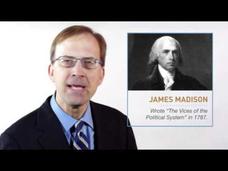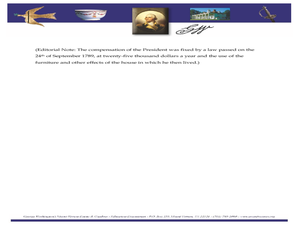K12 Reader
The Greatest President
Who is the greatest US president? George Washington? Abraham Lincoln? FDR? Find out the opinions of your young historians with this cross-curricular writing prompt that engages them in researching the accomplishments of these influential...
Bill of Rights Institute
Interstate Commerce and the Constitution
Who had power over trade in the early days of the United States? Who has power now? Viewers investigate the Commerce Clause of the United States Constitution. Using an AP Exam review video, learners examine issues surrounding authority...
National Endowment for the Humanities
Ratifying the Constitution
Ratifying the Constitution was no simple task. Using primary sources, such as classic writings from the Federalists and Anti-Federalists, young scholars examine the arguments for and against the Constitution. They then decide: Would they...
K20 LEARN
Analyzing Early American Figures: Analyzing History
Who were they? High school freshmen brush up on their research skills by investigating an important person in American history. They select a name, fill out a KWHL chart, and research why their person is important. Scholars then complete...
Curated OER
Establishing the Presidency
Middle schoolers consider how George Washington influenced the presidency. In this presidential history worksheet, students discuss the precedents Washington set and analyze a letter that Washington sent to James Madison.
National First Ladies' Library
Government: Defending the Bill of Rights
Pupils examine the proposition of a country without the Bill of Rights. In a role-playing activity, teams of students gather information to build a case for retaining the Bill of Rights and present it before their congressperson.
Judicial Learning Center
The Power of Judicial Review
Marbury v. Madison is arguably the most important landmark case in the history of the Supreme Court. A fact-filled lesson provides background information about the case and two others related to the concept of judicial review. Scholars...
Curated OER
History Biographies
Students explore the life and the contributions of five people from U.S. history in the five lessons of this unit. james Madison, Dolly Madison, Sequoyah, Harriet Tubman, and Clara Barton are presented to students for exploration and...
Center for Civic Education
Matching Game with the US Constitution
In September we celebrate Constitution Day. Begin the celebration with a grand conversation about the US Constitution. Follow up the in-depth discussion with a learning game in which scholars match terms to images such as the...
Curated OER
The Living Constitution
Students investigate why the Constitution is a living document and dissect the document to discover why it has survived while so many other charters have not. Students use James Madison's constitutional admonition concerning checks and...
Curated OER
The Monroe Doctrine: U.S. Foreign Affairs (circa 1782-1823) and James Monroe
High schoolers read the test of the Monroe Doctrine then list the key points and discuss its central tenets.
Curated OER
Lesson Two: The Federalist Papers
Pupils identify Articles of Confederation and explain why it failed, explain argument over need for Bill of Rights in Constitution and James Madison's role in securing it's adoption, and compare and contrast ideas of Federalists and...
Multieducator
Constitution and Federalist Papers
This reference app provides full text of the Constitution, including the amendments, as well as Madison's Journals, the Federalist Papers, Virginia Convention documents, and more. It also includes notes that provide additional...
National Endowment for the Humanities
The Monroe Doctrine: A Close Reading
Students identify specific passages in the Monroe Doctrine to events in early U.S. diplomacy.
Curated OER
Political Traditions
Students compare and contrast the political institutions in Greece, Rome, and the United States. In groups, they take this information to determine the influences on James Madison when organizing the republic. They develop a chart and...
What So Proudly We Hail
The Meaning of America: Enterprise and Commerce
Using Mark Twain's The Man That Corrupted Hadleyburg, invite your learners to consider the concept of virtue in a democratic society devoted to gain and self-interest. This stellar resource guides your class members through a close...
What So Proudly We Hail
The Meaning of America: Freedom and Individuality
What are the strengths and weaknesses of American individualism and independence? Explore these principles through a close reading of Jack London's To Build a Fire, and engage in high-level discussion with your class by analyzing the...
Curated OER
New $1 Coins Honor U.S. Presidents
Elementary schoolers examine money, then read a news article about new coins being produced by the U.S. Mint. The teacher introduces the article with samples of American money and a vocabulary activity, then students read the news piece...
Heritage Foundation
Congress's Territorial Powers, Implied Powers, Citizenship, and the Bureaucracy
An informative resource gives scholars a look into why the US Constitution placed certain federal powers over that of the state. A variety of activities about constitutional clauses helps to create meaningful learning.
Heritage Foundation
Slavery and the Constitution
It's hard to believe the abolition movement was once seen as scandalous. Help learners understand how the US Constitution changed everything. A variety of activities such as corresponding reading activities, group work ideas, and...
Constitutional Rights Foundation
If Men Were Angels: Teaching the Constitution With the Federalist Papers
Much like the methods of group work, the writers of the Federalist Papers worked together to advocate for their viewpoints against the anti-federalists. The resource enables learners to break into small groups and conduct research before...
What So Proudly We Hail
The Meaning of America: Equality
What if society sought equality by handicapping the gifted and dispelling any traces of diversity? Kurt Vonnegut Jr. offers one possible answer to this question through his incredibly engaging and thought-provoking satirical...
What So Proudly We Hail
The Meaning of America: Freedom and Religion
The United States of America was founded on firm ideals of both the pursuit of happiness and a spirit of reverence. Through a close reading of Nathaniel Hawthorne's "The May-Pole of Merry Mount," you can examine what some consider was a...
What So Proudly We Hail
The Meaning of America: National Identity and Why It Matters
Combining a close reading of a classic American text with the study of history can be a very powerful strategy, and this is most certainly the case with this resource using Edward Everett Hale's The Man without a Country. Consider themes...
Other popular searches
- James Madison Bio Poem
- James Madison Federalist 10
- James Madison Presidency
- James Madison President
- James Madison as President
- James Madison Biopoem
- James Madison for Children
- James Madison Presidencey
- James Madison Constiution
- James Madison Constitution

























